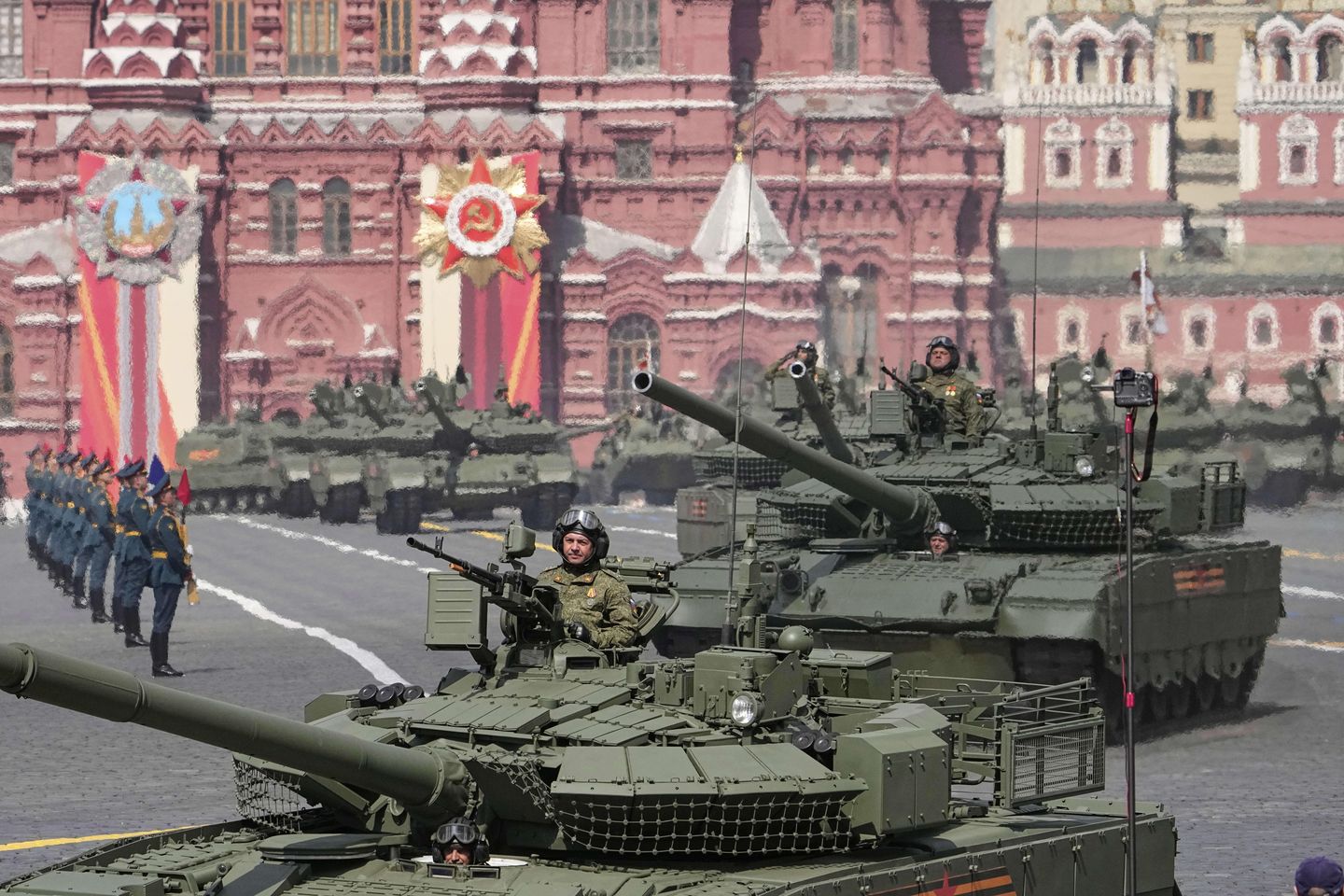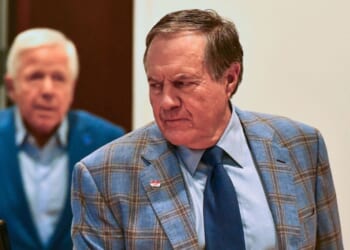
SEOUL, South Korea — Led by President Vladimir Putin in Red Square, Russians Friday celebrated the 80th anniversary of the end of World War II in Europe — a war in which more than 24 million Soviets were killed.
Though Germany surrendered in the ruins of Berlin on May 8, due to the time difference, Soviets, and subsequently Russians, commemorate the anniversary on May 9. It is the country’s most important nonreligious holiday.
Under bright sunlight, military hardware — armored vehicles, drones, nuclear-capable ballistic missiles — and some 11,500 troops marched across the iconic square, back-dropped by the red walls of the Kremlin and the colorful domes of St. Basil’s cathedral.
Friday’s events were overshadowed by the invasion Mr. Putin launched against Ukraine in 2022, triggering Europe’s bloodiest war since 1945. Unusually for a Victory Day parade, the saluting podium was roofed over, with analysts suggesting it was designed to protect dignitaries from a possible drone strike by Kyiv’s forces.
The day allowed Mr. Putin to demonstrate that Russia, despite sanctions and other pressure from the global north, is not isolated. World leaders including Brazilian President Luiz Inácio Lula da Silva, Slovakian Prime Minister Robert Fico and Chinese President Xi Jinping were in attendance.
China has upped trade with Russia since 2022, increasing imports of energy while exporting finished goods, including dual-use components that are not sanctioned, but can be used in arms manufacture.
Unlike Iran and North Korea, two other members of the unofficially titled “CRINK” (China, Russia, Iran, North Korea) group of anti-Western states, however, Beijing has not sent actual weapons.
North Korean troops, who played no role in World War II but who represent Russia’s only allies in the Ukraine conflict, were also present. Mr. Putin chatted and bear-hugged bemedaled officers in Red Square.
North Korean leader Kim Jong-un stayed home but visited the Russian Embassy in Pyongyang on Friday. On Thursday, he had overseen tests of nuclear-capable ballistic missiles and large-caliber multiple launch rocket systems.
South Korean experts had predicted that Mr. Kim would not attend. He has met foreign leaders bilaterally, but never attended a multilateral event.
Nor did any significant VIP from Western nations that fought Nazi Germany, but which are now deeply concerned by Russia’s ongoing invasion of Ukraine, showed up.
The political cleavage between Russia and the West over Ukraine reflects a split in historical remembrances of World War II. Both Mr. Putin and U.S. President Trump have waded into that space.
Wars, history wars
“Victory was only accomplished because of us,” Mr. Trump wrote on Thursday on Truth Social. “Without the United States, the War would have been won by other Countries, and what a different World it would be.”
Mr. Putin differed. “The opening of the second front in Europe” — the Western Allies’ June 1944 D-Day invasion of Normandy — “hastened victory,” he said in Red Square Friday, but asserted that it came “after the decisive battles on Soviet territory.”
He continued, “The Soviet Union bore the fiercest, most merciless blows of the enemy … determining the outcome of the entire Second World War through unconditional victories in the greatest battles.”
Thanks to history teachers, books and films, the anglosphere is familiar with the Dunkirk Evacuation, the Battle of Britain, D-Day, the Arnhem air assault and the Battle of the Bulge. The same is true of Gen. Bernard Montgomery, Gen. George Patton and Gen. Dwight Eisenhower.
In World War II, the Western Allies dropped more bombs on Germany than any other nation, and decimated its sea and air forces. U.S. manufacturing played a central role in economic warfare.
The Soviet role is less known.
“Every nation remembers history in a selective fashion,” said Prit Buttar, a retired British Army officer who has published books on the Eastern Front and the Holocaust. “English language narratives rarely give the Eastern Front the attention it deserves, largely because no English speakers were involved.”
The Red Army faced the bulk of the Nazi war machine: According to the New Orleans’ U.S. National World War II Museum, 75-80 percent of Germany’s forces deployed in the East, not the West.
“The struggle on the Eastern front was of a titanic scale,” said Gastone Breccia, a military historian at Italy’s University of Pavia. “The losses were so staggering as to bleed white the Wehrmacht.”
Stalingrad — a 1942 battle in which a Germany army was annihilated — was a psychological jolt from which German dictator Adolf Hitler and his public never recovered. The last strategic offensive launched by the German Army was pushed back in massive armored clashes at Kursk in 1943.
Operation Bagration, which took place at the same time as the Allied struggle in Normandy in 1944, caused greater losses to German forces than any other battle. Eventually, Soviet forces seized Berlin in 1945.
The blood price was colossal. Per the World War II Museum, the U.K. lost 450,700 persons and the U.S. 418,500 in the war. But the USSR lost a staggering 24 million: the greatest wartime body count ever. Some historians put the toll as high as 28 million.
Weaponizing history
For Russians, World War II remains emotive — and its language has been revived.
Though Ukrainian President Volodymyr Zelenskyy, a Russian-speaking Jew, leads in Kyiv, Mr. Putin calls for the “de-Nazification” of Ukraine.
“Russia was, and will remain, an unshakeable barrier against Nazism,” Mr. Putin said Friday. “The entire country, society and people support the participants of the special military operation” — the invasion of Ukraine.
Russian troops often dub Ukrainians “Banderites” after Stepan Bandera, a Ukrainian nationalist who was imprisoned by the Nazis, but subsequently joined them. Ukrainians were also used as auxiliaries during the Holocaust.
“In occupied parts of the Soviet Union, Germans made use of nationalist, anti-Bolshevik movements for many purposes,” in World War II, Mr. Buttar said. “Ukrainian nationalists were encouraged to believe that they may get a degree of autonomy, but that was never the [Nazi] intention.”
Though some modern Ukrainian units sport Nazi insignia, historians say history is being weaponized.
“There are fascist elements in Ukraine but they are in the minority — and there are also fascist elements in Russia,” said Douglas Nash, a retired U.S. Army colonel and historian who has published multiple books about Nazi Germany’s armed forces.
Dubbing millennial Ukrainians Nazis is “Putinian propaganda,” Mr. Breccia said. “Ukrainians fought by the hundreds of thousands with the Red Army in World War II.”
Russians who oppose Mr. Putin’s “special military operation” face an unpleasant historical irony.
“The longer this war drags on, the more fascist and repressive Putin must become in order to keep the fight going,” said Mr. Nash.












